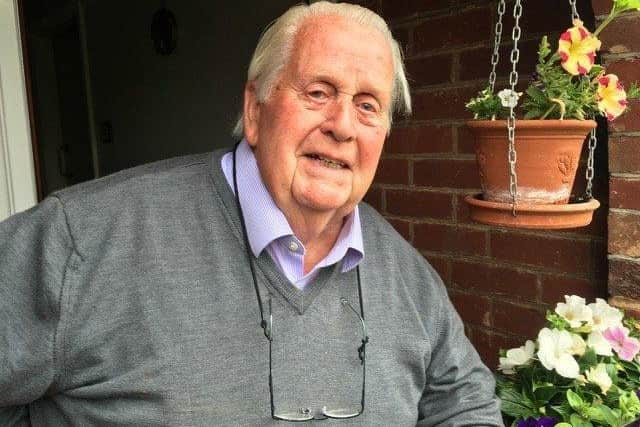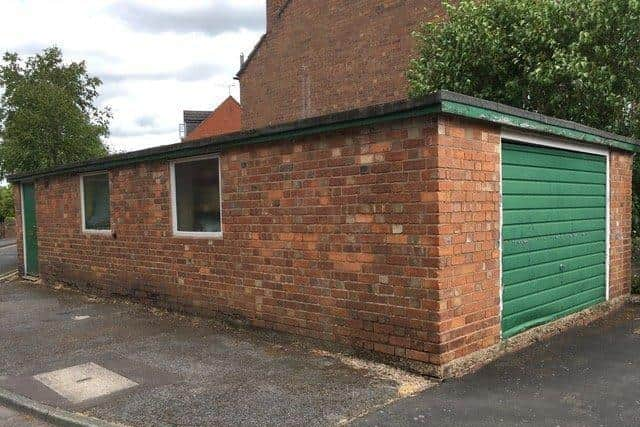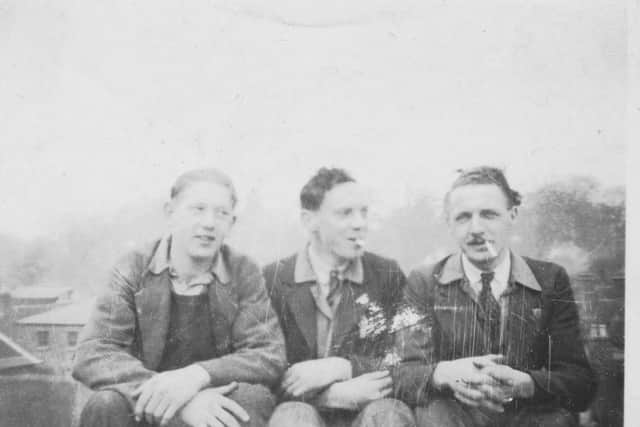Udders, whale meat, POWs and air raid shelters – Warwick resident recalls life during the war
and live on Freeview channel 276
Graham Doughty, a retired engineer still living in Warwick, got in touch with Unlocking Warwick, Warwick Town Council volunteers, after reading in the Courier about their research into Warwick during the Second World War.
He was only six years old on VE-Day, but he remembers the final years of the war vividly.
Advertisement
Hide AdAdvertisement
Hide AdGraham’s father was the groundsman at Warwick School for many years. The family lived in Wathen Road, between the station and the hospital.


These are his recollections of the war years:
“There was no TV and little radio for children in those days, so my twin sister and I spent a lot of time outside and we saw a lot of what was going on.
“There were siding on our side of the station and that is where the Red Cross trains would arrive with wounded from France. The coaches were painted white with large red crosses on them.
"They were full of injured solders, some on stretchers or trollies, some heavily bandaged and covered in blood.
Advertisement
Hide AdAdvertisement
Hide Ad

“Most had to walk or be helped along the road to the hospital where they were packed like sardines. There were so many of them.
“The trains would usually arrive on a Thursday. I remember that because it was the day my mother would go for her weekly rations.
"Everyone had to register with a particular shop for their rations; ours was the Co-op in Emscote Road, and we would walk past the wounded soldiers making their way to the hospital.
“If the weather was good, the recovering soldiers would come out and sit on the large area of open land at the back of the hospital – now a car park. At the bottom of our garden there was a little bridge over a stream and we could walk across it and climb into the hospital grounds.
Advertisement
Hide AdAdvertisement
Hide Ad

“I would dress as a soldier and my sister dressed as a nurse. We would sing songs for the soldiers and they would reward us with sweets.
“The soldiers weren’t allowed to buy beer, but my father used to let some of them into our back garden and give them some beer, which wasn’t breaking the rules!
Air Raid Precautions
“The air raid siren was a big powerful one on a high pole over the Fire Brigade HQ in The Butts. The town was pretty quiet in those days with hardly any traffic, so when it went off it could be heard for miles around.
“Sometimes at night the anti-aircraft guns around the town would open-up making quite a racket. We could hear things landing on our roof.
Advertisement
Hide AdAdvertisement
Hide Ad"At first my sister and I thought they were bombs but we were told it was bits of ack-ack shell-casing and other shrapnel showering down. We boys used to collect it and compare pieces at school.
“We also collected ‘windows’, the ribbons of silver paper that the German aircraft released to baffle our radar. It would festoon the trees sometimes.
“My brother saw the German plane that dropped bombs on the racecourse killing two men. It had a large cross on the side and he overheard two women talking nearby saying, ‘Ooh look a Red Crossplane!’ Then boom!
“There were air raid shelters all over town. The main ones were long brick buildings with a concrete roof. One of the biggest was where New Street car park is now. The smaller brick ones were called ‘blast shelters’.
Advertisement
Hide AdAdvertisement
Hide Ad"There was a row of at least a dozen of them along the side of Cape Road. One of the bigger ones still exists in Woodville Road more than 80 years after it was built; it’s used as a storeroom these days.
“The Tink-a-Tank alley was roofed over to form a long shelter. It was very dark and we used to dare each other to run through it.
“The tunnel under the Westgate was another shelter, and was very popular with girls meeting American GIs in the dark.
“The air raid siren was tested every Wednesday at noon when the all-clear was sounded. People would set their clocks by it, and after the war they wanted to keep hearing the all-clear once a week, so it continued to be sounded well into the 1950s.”
Schooldays
Advertisement
Hide AdAdvertisement
Hide Ad“When they had reached five years of age, all children had to go to school. So the day after my fifth birthday, my mother took me to Westgate School; we didn’t have to wait until the start of a term.
“After a few days I was walking to school on my own. No one thought twice about a five-year-old walking that far alone. There wasn’t much traffic and people didn’t worry about other possible dangers like they do now.
“I’d stay at school for lunch, and walk home on my own at the end of the day.
“School lunches or ‘dinners’ were introduced during the war to allow the mothers to do war work.
Advertisement
Hide AdAdvertisement
Hide Ad“Before that all the children went home for lunch. There were no kitchens in the schools, so the big kitchen at the mental hospital in Hatton was used, and vans would deliver the meals to the town’s schools in insulated containers.
"At our school there were ‘container monitors’ who would bring them into the dining area. The Hatton Hospital had large grounds with areas of fruit and veg, so we ate what was in season – sometimes damsons or plums.
"The meat was often stew, probably made from offal. I quite liked cows’ udders! And we often had whale meat. I don’t think we minded; that’s just the way it was.
“I had four brothers who were quite a lot older than me. At the age of 17 one of my brothers, Ken, was told to do fire-watching duty on top of the old County Cinema, formerly a theatre, at St John’
Advertisement
Hide AdAdvertisement
Hide Ad“So he and his teenage friends built a rope ladder out of the scenery ropes and climbed on to the roof.
“Lots of teenagers did fire-watching. Everyone did as they were told. It was their duty. Eventually all four of my brothers went off to war; fortunately they all came back.”
The POWs
“There were three Prisoner of War camps in Warwick – for the Germans, the Italians and the ‘Czechs’ as we called them – East Europeans.
"The Germans were kept very securely in a camp up the Banbury road, but I was allowed inside on one occasion after I had fallen off my bike and had a bleeding head injury.
Advertisement
Hide AdAdvertisement
Hide Ad"The guard waved me through the barbed wired gate and I was taken to the infirmary where the Germans stitched me up. They were very nice – lots of blond young men as I remember.
“The Italians were based at the racecourse and were allowed into the town. They were very popular, especially with the girls.
“They were still here until 1947 when repatriation was finally arranged. I seem to remember a number of Italian-looking babies were born at that time.”
My First Banana
“The rationing was pretty strict but my sister and I didn’t know anything different.
Advertisement
Hide AdAdvertisement
Hide Ad“I used to look at a picture of a banana and wonder what it tasted like. Then one day, after queuing for an hour, our mother came home with two bananas.
"This rare item was rationed to one per child; because she had twins she could have two.
“My sister was at home but I hadn’t arrived back from school, so mother said she should wait until I got home so that she could take a picture of us with our bananas.
“But my sister couldn’t wait and ate hers.
“Occasionally we had oranges and of course we ate all of them including the skins. So when I finished eating my banana I tried eating the skin. It was pretty horrible.”
VE-Day
Advertisement
Hide AdAdvertisement
Hide Ad“VE-Day was quite a shock really. I had been brought up in a dark world. The ARP wardens would be very fierce if they saw a light at night time, even a cigarette.
“Suddenly everyone had their lights on and were singing and dancing. I remember a lorry with all its lights on piled high with people – you could hardly see the lorry. And there was a band marching round town and everyone dancing and singing.
“It was such a happy time.”
Unlocking Warwick is keen to add to its research on the Church Street war memorial, and on life in Warwick during the war.
Email your family photos or information about the Warwick men who died in WW2 to Christine Shaw at [email protected] or if scanning photos or emailing is difficult, ask someone to email your phone number and one of the volunteers will give you a call.